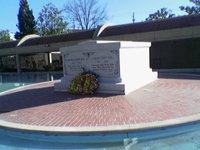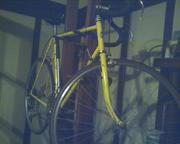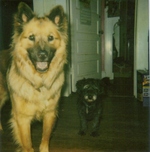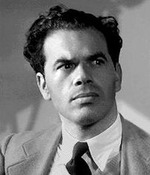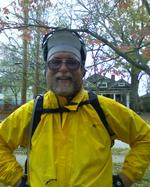Think of this as Volume 11, Number 14 of A-Clue.com, the online newsletter I’ve written since 1997. Enjoy.
On sunny Sunday mornings, while the rest of Atlanta is in bed, at church, or huddling over brunch, I ride my bike downtown and visit Dr. Martin Luther King Jr. (right).
It’s quiet then. Just a few Japanese tourists wander by. If it’s sunny, if I’ve been riding a few hours, I will sit by the reflecting pool and talk to him.
I don’t expect him to talk back. He’s dust. His tomb is a symbol for the life he lived, and the work he did. I was pleased when I snapped this picture, because it shows his wife Coretta is now with him. She lived nearly as long without him as he’d spent time on this Earth (38 years against 39) but they’re together now in heaven, and in memory.
You might say that on these Sundays I’m praying, but that would be
blasphemous. Dr. King was just a man, with a man’s faults and a man’s
vanity. As I am. As we all are. As the miracle of Christianity tells us
Jesus Christ was.
God made man with faults, and these flaws ultimately lead all men to
dust. Longevity has its place, but so does mortality. Mortality forces
us to consider our decisions closely, knowing our choices are limited.
Dr. King did not want this burden placed on him. He did not set out
to be a Great Man. He set out to be a good one, the son of a minister,
married into one of Atlanta’s great families, the Scotts. He knew
people would look to him just as they had looked up to his father, the
man known for years to white Atlanta as "Mike" King, and after his
son’s death, always, as the Rev. Dr. Martin Luther King Sr.
Dust has a place in technology, too. The computer I’m writing on now
crashed repeatedly over the last few weeks, and when we opened it up we
found it was filled with dust. Electronic parts attract dust. I knew
this as a child, in my dad’s TV repair shop. Each time we took apart a
set the dust would fly.
Dust is the end of both organic and inorganic processes. Wear away a
rock and you get dust. Let a dog lie in your home, as dogs do, and you
get a lot of dust. Look carefully one day in your bed, through the
light shining into the window, and you’ll see dust floating there,
looking for a place to land.
Dust is one big reason we need a War Against Oil. Hydrocarbons burn
to ash, to dust, and that’s a key component in pollution. Clean energy
takes carbon out of the equation. It’s all gases, no solids, just hydrogen
and oxygen and (sometimes) nitrogen. No dust.
Dust in the form of death has been stalking me this year. My father-in-law, my friend
Russell. It hovers over my family and seeks its turn with us. My daily
workouts, my cup of green tea, my regular habits, they’re not moral
choices, they’re just part of my fight against dust.
Dust carries important lessons and challenges for all of us every
day. Male or female, young or old, dust haunts us, it gets inside and
seeks purchase in our lungs, it calls to us from beyond the grave, yet
it’s part of the life cycle, as natural (often) as we are.
Our political choices, the regular pattern of thesis, validation,
anti-thesis, excess and crisis is really all about dust, and its
cycles. The Roosevelt Era is mainly historical memory now, just dust. Those in the
media and politics who recall it remember only its fall, its period of
excess. So its time of glory, the importance of its great theme, unity,
can’t be recaptured. John Edwards tried, but too few heard. He wound up
only gathering to him men accused of wealth and guilty of education.
The targets of his message ignored it.
There is a big difference between the Thesis of Consensus, which
Barack Obama hopes to install, and the Thesis of Unity which Roosevelt
brought to power. You can see it in all the movies of the Roosevelt
High Thesis period, nearly every day on TCM. Look for it especially in the movies of Frank Capra (right).
The defining word is obligation. Obligation to others, to the country, to our communities, to each other. Obligation is the theme, its joy and its sorrows, and in each of Capra’s films it is always validated.
Obligation is not consensus. Consensus is enough general agreement
to move forward in a given direction. We can’t bring back FDR any more
than we can bring back Hitler, nor would we want to. The only way to
really fight dust is to move forward.
On some Sunday mornings I bring all this to Dr. King, and I lay them
before him as he rests in heaven. I lied, a bit, when I said he doesn’t
answer. His answer comes in the endorphins flowing through me, and the
warm Sun in my eyes. His answer comes in the quiet and the reverence
with which others move around me, whatever their age, sex or color. It
comes in the respect they give me, to offer my peace, and to seek peace
in this spot, as they seek peace.
And there, in that peace, we all make our choices. Generally, because of that peace, the choices we make there are good ones.
Then we all go off, in cars, on buses, or (in my case) on my bike.
We go back to fight the dust, knowing the cause is ultimately hopeless,
but also knowing it’s a fight we choose to make, and that it’s a noble
one.
We can only fight the dust within our time, and for our time. But memorials like the King Center remind us of what abides, and that the struggle is always worthwhile.


